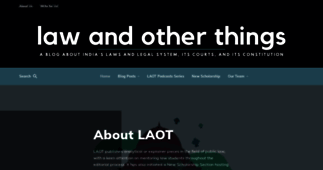Law and Other Things
Enter a key term, phrase, name or location to get a selection of only relevant news from all RSS channels.
Enter a domain's or RSS channel's URL to read their news in a convenient way and get a complete analytics on this RSS feed.
Unfortunately Law and Other Things has no news yet.
But you may check out related channels listed below.
[...] (Guest Post: Rajgopal Saikumar) “TheShifting Scales of Justice: The Supreme Court in Neo-liberal India” ed. Mayur Suresh and Siddharth Narrain (Orient Backswan, 2014) is [...]
[...] A paper I wrote on the institution of the law clerkship on the Supreme Court of India was published in the International Journal of the Legal Profession, and is now [...]
[...] Guest Post by Abhinav Sekhri I recently happened to visit the Supreme Court of India where I required a “proximity-pass” for gaining entry to the building. [...]
[...] month, entitled “The Informal Constitution: Unwritten Criteria in Selecting Judges for the Supreme Court of India”, I explore the prevalence of three informal eligibility criteria for appointing [...]
[...] In an earlier post I began to probe the meaning of Article 145(3) of the Indian Constitution. Article 145(3), which I will quote at length for reasons that hopefully will soon become [...]
[...] . A revised version of it will be published in the upcoming Oxford Handbook on the Indian Constitution, which will contain an impressive range of chapters on the Indian Constitution and is being [...]
[...] challenged as undercutting judicial independence and violating the Basic Structure of the Indian Constitution - it was already challenged in a set of PILs back in August, but the Court at that time [...]
[...] Samvidhaan, the much awaited series on the making of the Indian Constitution directed by Shyam Benegal begins on Rajya Sabha TV today. The first of the 10 part series [...]
[...] With the passage of the 121stConstitutional Amendment Bill and the attendant National Judicial Appointments Commission Bill, the collegium system of appointments, now 21 years in the making, is [...]
[...] I think if a true opposition party emerges and a leader is appointed then reforms like the Judicial Appointments Commission still makes sense - which relies on the government in power, the opposition, [...]
[...] members of the bar. Srinivasan also criticizes the general lack of transparency in judicial appointments of arbitrators. His research demonstrates that Indian courts significantly influence [...]
[...] apply to the Bill, as unlike public services, there are no such exigencies involved in judicial appointments. Additionally, there are no pre-existing rules or any adoption of such in the Bill. Unlike [...]
[...] a focus on "pendency" of cases as the parameter to evaluate the performance of the judicial system, to focusing on those pending cases which are delayed. Currently we have no rational [...]
[...] A natural assumption regarding any judicial system that seeks to resolve legal disputes, is that lawyers would be permitted to participate in [...]
[...] in India. The post highlights concerns with data collection methodologies within the judicial system, as also with the lack of evidence based reform of the judiciary. I'd welcome your comments [...]
[...] conformity with such judgment." These three articles are instrumental in directing the judicial system how to decide questions of constitutional law. Should we interpret the "substantial [...]
[...] gay rights only after the court refused to play ball, but the Executive response was to seek judicial review rather than go to Parliament. The courts are no doubt legislating. But on the whole, the [...]
[...] propositions. Illustratively, a well established proposition (such as the fact that "judicial review" is now part of the basic structure) which could have been disposed in a paragraph or [...]
[...] the same reliefs.” It is also pertinent to note that other important questions such as the judicial review of the Speaker’s decision was not decided by the Court. Since the petition was not [...]
[...] . Under Article 145 and 229, rules drafted by judicial organs continue to be subject to judicial review, and may be struck down if repugnant to any constitutional provision. The rules of the NJAC, [...]
[...] ;Justice Lodha was of the view that two or three Judges cannot decide the validity of Constitutional amendments, and that there cannot be a more substantial question than the interpretation of a [...]
[...] structure. As such, the introduction of the words secularism and socialism through constitutional amendments is not destructive of the Constitution but rather explicates the basic structure [...]
[...] conventions" and for holding that even normal legislation (as opposed to constitutional amendments) can be reviewed for compliance with the basic structure doctrine. [...]
[...] (Guest Post: Rajgopal Saikumar) “TheShifting Scales of Justice: The Supreme Court in Neo-liberal India” ed. Mayur Suresh and Siddharth Narrain (Orient Backswan, 2014) is [...]
[...] A paper I wrote on the institution of the law clerkship on the Supreme Court of India was published in the International Journal of the Legal Profession, and is now [...]
[...] Guest Post by Abhinav Sekhri I recently happened to visit the Supreme Court of India where I required a “proximity-pass” for gaining entry to the building. [...]
[...] month, entitled “The Informal Constitution: Unwritten Criteria in Selecting Judges for the Supreme Court of India”, I explore the prevalence of three informal eligibility criteria for appointing [...]
Related channels
-
Lawctopus
for law students in India: internships, things to do, advice on career in law
- Time Legal News
-
Online Press Release Distribution Service | FreePressIndex.com
Latest News | FreePressIndex.com
-
Minglebox Education News
Education News and Views that you can use.
-
Federal State Labor Law Poster Store - new products
Labor law posters for your business compliance needs. We provide a wide range of required state labor law posters, feder...

